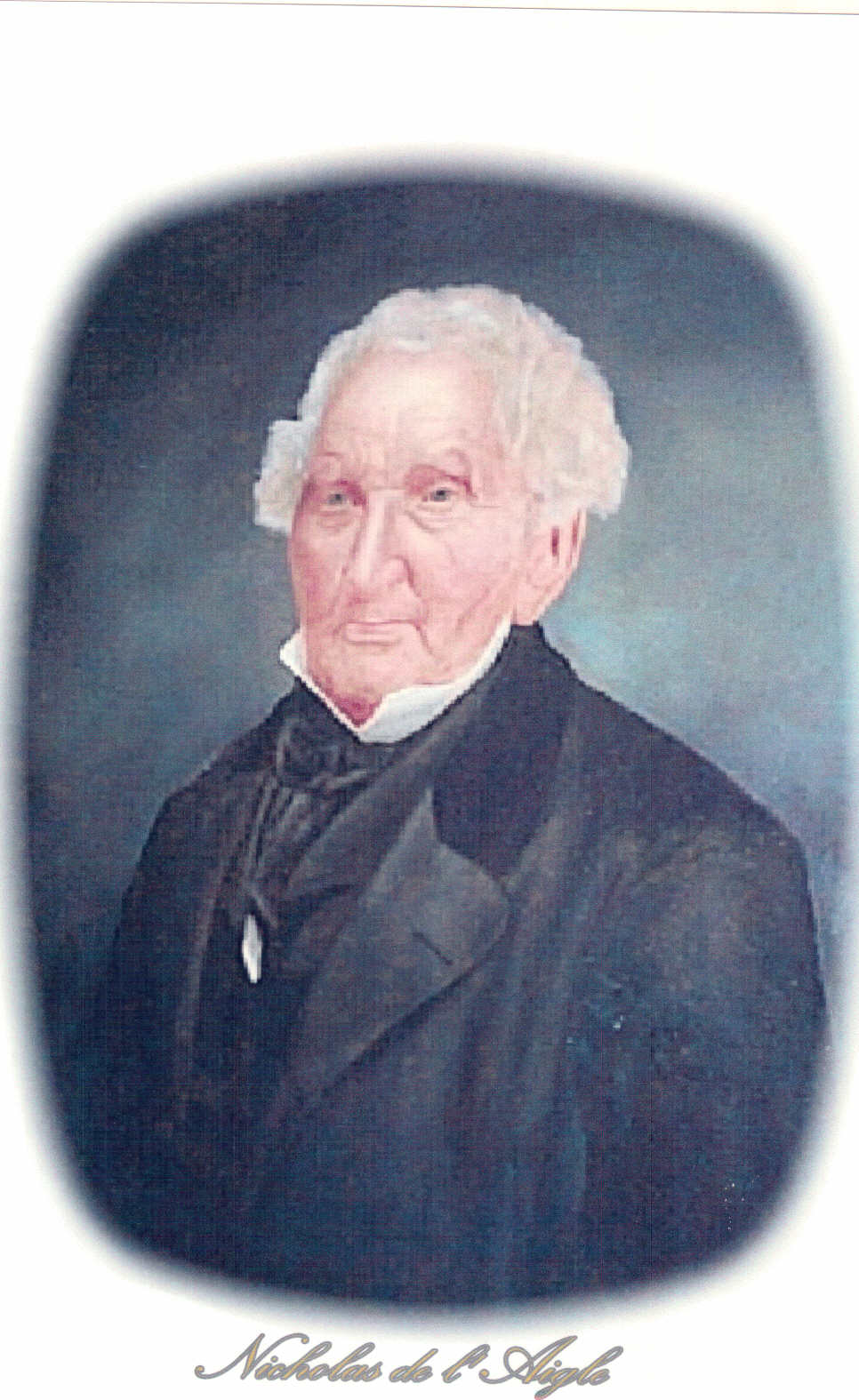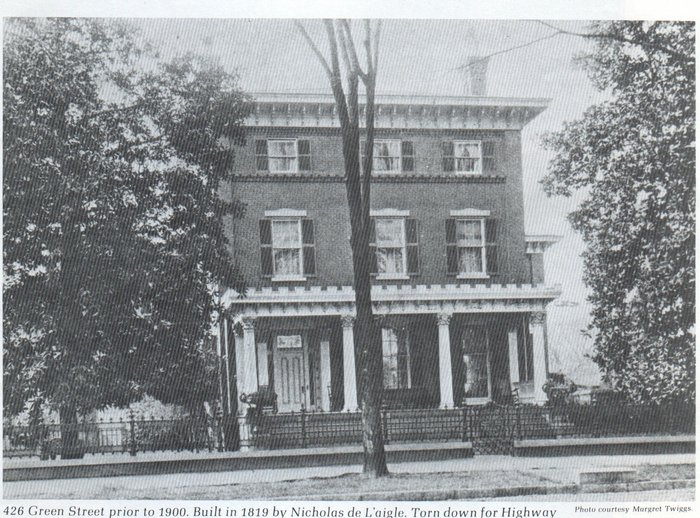He was a merchant in Savannah, GA for awhile becoming a naturalized citizen on December 16, 1803 while there. After his marriage, they moved to Augusta, GA. He amassed a considerable fortune for the day as a planter with a plantation (14,000 acres) along the Savannah River. He owned the first brickyards in the South, and built a beautiful home in Augusta on Greene Street, as well as owning several other properties. • By the plantation standards of 1818, he was among the "greats" of the Augusta area, owning over 100 slaves. • As an influential citizen of Augusta, on March of 1825 he was among the delegation that welcomed the Marquis de LaFayette to the city, greeting him in French. • On August 18, 1832, the leaders of Augusta met "in the name of Washington, that 'saint of liberty'." They agreed to send delegates to the state convention to be held in Milledgeville, where there was a proposed resolution for the convention to have "full powers" to act with regards to nullification of the tariff laws; but the Augusta leaders said...."we will not give our votes to any candidates....who are advocates of that doctrine". "Backers at this meeting included many of the leading citizens: Valentine Walker, Thomas Flournoy, Thomas Cumming, William Cumming, Nicholas DeLaigle ...." (etc). • In March of 1845, he was one of the city leaders involved in the construction of the Augusta Canal. • There are tales about the magnificent home he built on Greene Street, supposedly built from bricks he had to import from England; "the entire top floor with a solid mahogany staircase lading up to it. The house had three drawing rooms ,and there were slave quarters in the rear which had a large brick fireplace and a brick oven. Beneath the house, as was fitting for a French owner, were two plastered wine cellars, floored with brick and provided with shelves along the walls for kegs and demijohns." This home was torn down to make way for the Interstate system through Augusta. But several other DeLaigle homes survive, most notably another one on Greene Street across from the courthouse.
Nicolas married Marie Marguerite Roullet/Roslette (LaGarde) ca 1800 in Savannah, GA. Marguerite was born 1766 in Saint Dominque, West Indies, of French ancestry. The actual spelling of her maiden name has been lost. Marguerite's first husband was Pierre Antoine Jacques LeGarde, who died 13 Sep 1798 in Savannah, GA. Marguerite and Jacques had escaped from St. Dominique with their two surviving daughters, Cleobelle and Emma, on the same ship as Nicolas de l'Aigle.
A published account about Nicolas and Marguerite says, "Legend has romantic stories of Nicolas de l'Aigle, who escaped death on the guillotine during the French Revolution. Migrating to San Dominogo, he found his life again endangered so he was smuggled aboard a vessel bound for America. Pirates captured the ship and compelled many of its passengers to "walk the plank", but de l'Aigle, flourishing a Mason medal was saved, with his companions, a family named Le Garde. Mon. LeGarde died in Savannah and de l'Aigle brought Madame LeGarde and her two children to Augusta where he later married her. On his flight from San Domingo he covered gold pieces in cloth, sewed them as buttons on his clothes. In Augusta, he accumulated land, slaves, and money, and the legend still persists that the de l'Aigle treasure is buried somewhere in the city."
Nicolas died 22 Oct 1853 in Augusta, GA. His obituary read: "ANOTHER OLD CITIZEN GONE: "It is a melancholy duty we have to perform this morning, in announcing the death of another of our oldest and most respected citizens. Mr. Nicolas DeLaigle, who departed this life yesterday, at his residence near the city. He died at the advanced age of 87 or 88, was a native of the northern portion of France, and resided in our midst some fifty or sixty years. He leaves behind him a large family and numerous friends, who will sincerely mourn their loss. Enemies he has left none. His funeral takes placed this afternoon, at half past three o'clock, from the Catholic Church." Nicolas and Marguerite are buried in the family plot in Magnolia Cemetery. Nicolas deeded the land for Magnolia Cemetery to the city of Augusta by 1818. Magnolia Cemetery became one of the nation's first ‘garden cemeteries."
Nicolas and Marguerite had one son, Charles DeLaigle.
(Submitted by [email protected])
He was a merchant in Savannah, GA for awhile becoming a naturalized citizen on December 16, 1803 while there. After his marriage, they moved to Augusta, GA. He amassed a considerable fortune for the day as a planter with a plantation (14,000 acres) along the Savannah River. He owned the first brickyards in the South, and built a beautiful home in Augusta on Greene Street, as well as owning several other properties. • By the plantation standards of 1818, he was among the "greats" of the Augusta area, owning over 100 slaves. • As an influential citizen of Augusta, on March of 1825 he was among the delegation that welcomed the Marquis de LaFayette to the city, greeting him in French. • On August 18, 1832, the leaders of Augusta met "in the name of Washington, that 'saint of liberty'." They agreed to send delegates to the state convention to be held in Milledgeville, where there was a proposed resolution for the convention to have "full powers" to act with regards to nullification of the tariff laws; but the Augusta leaders said...."we will not give our votes to any candidates....who are advocates of that doctrine". "Backers at this meeting included many of the leading citizens: Valentine Walker, Thomas Flournoy, Thomas Cumming, William Cumming, Nicholas DeLaigle ...." (etc). • In March of 1845, he was one of the city leaders involved in the construction of the Augusta Canal. • There are tales about the magnificent home he built on Greene Street, supposedly built from bricks he had to import from England; "the entire top floor with a solid mahogany staircase lading up to it. The house had three drawing rooms ,and there were slave quarters in the rear which had a large brick fireplace and a brick oven. Beneath the house, as was fitting for a French owner, were two plastered wine cellars, floored with brick and provided with shelves along the walls for kegs and demijohns." This home was torn down to make way for the Interstate system through Augusta. But several other DeLaigle homes survive, most notably another one on Greene Street across from the courthouse.
Nicolas married Marie Marguerite Roullet/Roslette (LaGarde) ca 1800 in Savannah, GA. Marguerite was born 1766 in Saint Dominque, West Indies, of French ancestry. The actual spelling of her maiden name has been lost. Marguerite's first husband was Pierre Antoine Jacques LeGarde, who died 13 Sep 1798 in Savannah, GA. Marguerite and Jacques had escaped from St. Dominique with their two surviving daughters, Cleobelle and Emma, on the same ship as Nicolas de l'Aigle.
A published account about Nicolas and Marguerite says, "Legend has romantic stories of Nicolas de l'Aigle, who escaped death on the guillotine during the French Revolution. Migrating to San Dominogo, he found his life again endangered so he was smuggled aboard a vessel bound for America. Pirates captured the ship and compelled many of its passengers to "walk the plank", but de l'Aigle, flourishing a Mason medal was saved, with his companions, a family named Le Garde. Mon. LeGarde died in Savannah and de l'Aigle brought Madame LeGarde and her two children to Augusta where he later married her. On his flight from San Domingo he covered gold pieces in cloth, sewed them as buttons on his clothes. In Augusta, he accumulated land, slaves, and money, and the legend still persists that the de l'Aigle treasure is buried somewhere in the city."
Nicolas died 22 Oct 1853 in Augusta, GA. His obituary read: "ANOTHER OLD CITIZEN GONE: "It is a melancholy duty we have to perform this morning, in announcing the death of another of our oldest and most respected citizens. Mr. Nicolas DeLaigle, who departed this life yesterday, at his residence near the city. He died at the advanced age of 87 or 88, was a native of the northern portion of France, and resided in our midst some fifty or sixty years. He leaves behind him a large family and numerous friends, who will sincerely mourn their loss. Enemies he has left none. His funeral takes placed this afternoon, at half past three o'clock, from the Catholic Church." Nicolas and Marguerite are buried in the family plot in Magnolia Cemetery. Nicolas deeded the land for Magnolia Cemetery to the city of Augusta by 1818. Magnolia Cemetery became one of the nation's first ‘garden cemeteries."
Nicolas and Marguerite had one son, Charles DeLaigle.
(Submitted by [email protected])
Inscription
In the 87th year of his age.
Family Members
Advertisement
Explore more
Sponsored by Ancestry
Advertisement













